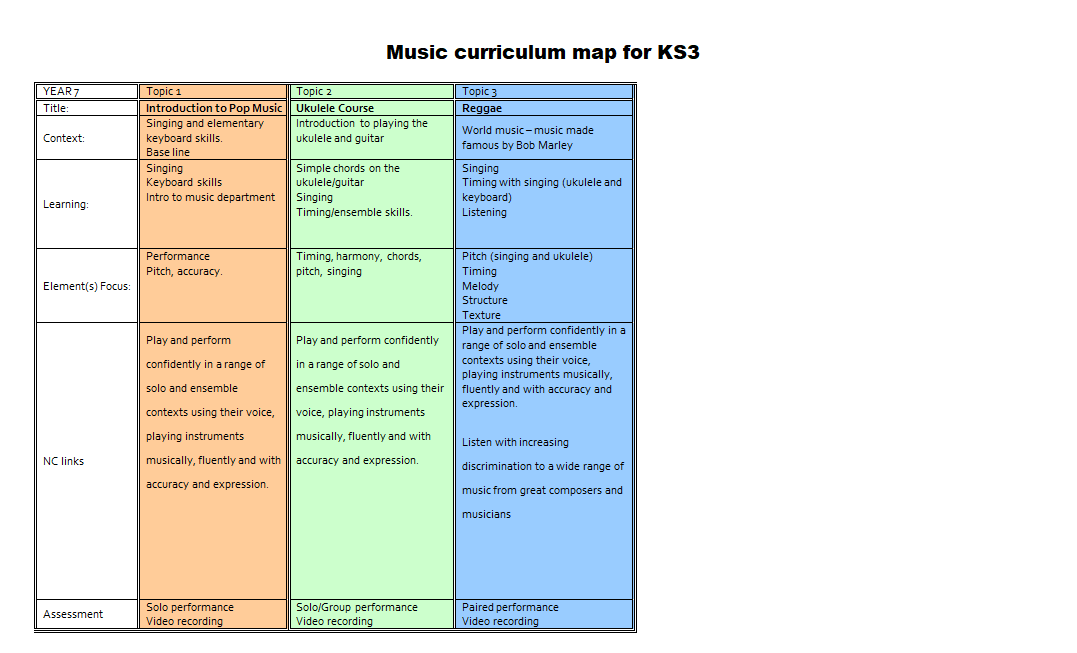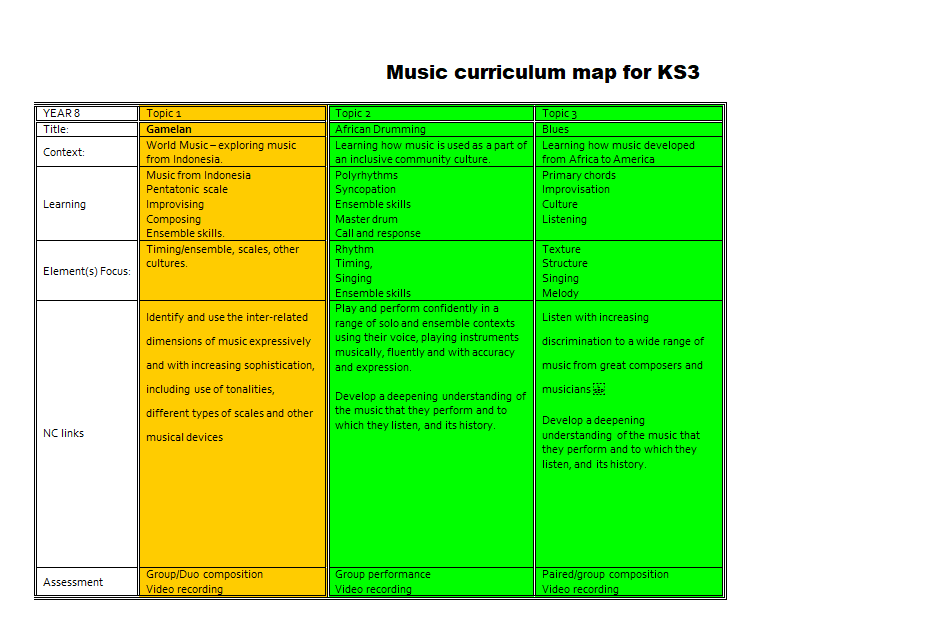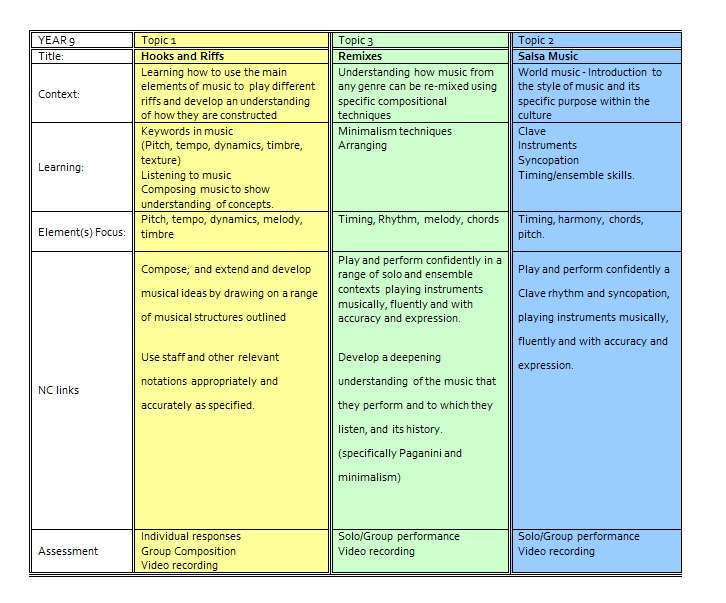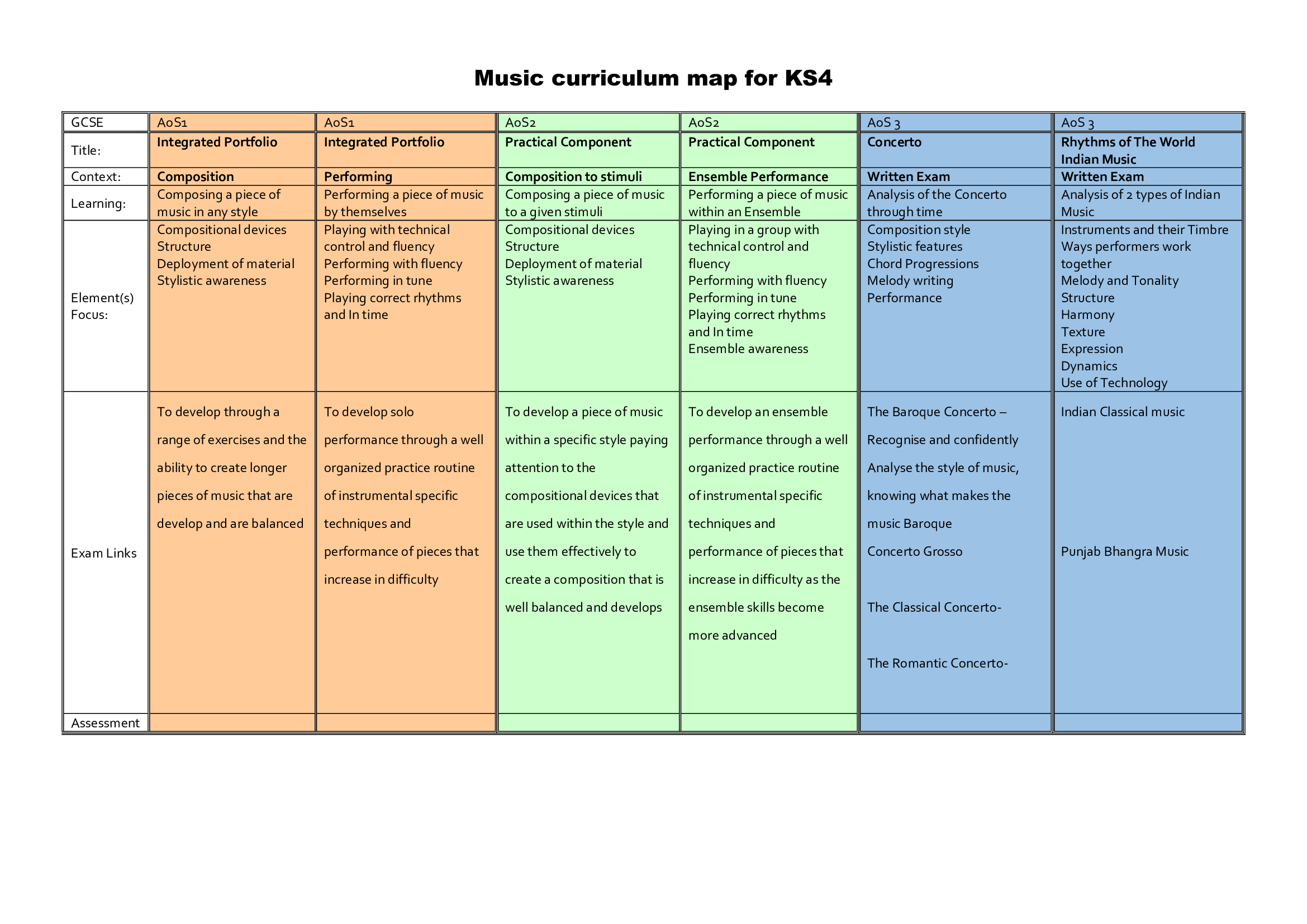Parents
Pupils
Staff
Special Educational Needs
Governance
Meet our Community
Wellbeing
Music
Music Develop Plan
September 2024
Review date July 2025
Music lead: D.Birch
SLT link: S Paxton-Gault
Local Music Hub: Birmingham Music Services
Music Curriculum time
KS3 – 1 hour per week
KS4 – Year 10 s hours per week, Year 11 2 hours week 1 and 3 hours week 2.
SEND:
We are whole heartedly committed to improving Special Educational Needs and Disabilities (SEND) support within the music department of Hall Green school. As a department we recognise the importance of inclusivity and accessibility to music education. Our main aim is to have an inclusive and supportive environment where all students, regardless of their abilities, can engage with and ‘thrive’ in music.
Steps to success:
1. Collaboration with the Special Educational Needs Coordinator (SENCO) and other relevant professionals to identify the specific needs of our students with SEND in the music department.
2. Develop schemes of work for ensuring that they accessible.
3. Provide ongoing training and support for music department staff to enhance their understanding of SEND and effective teaching strategies for various learning needs.
4. Have a culture of acceptance and empathy among students and staff, promoting an environment where differences are celebrated and all students feel valued.
5. Act upon feedback from parents and students to continually improve SEND provision in the music department.
To conclude: We aim to have initiatives in the music department that inclusive and enrich the lives of those we teach, embracing different ways music is created around the world. A department where every student can develop their musical talents, regardless of their abilities or disability. We aim to be part of family of subjects that enriches the lives of all the members of our school community.
Music SEND Adaptations Statement
How does our SEND Curriculum Intent translate into practice at Hall Green School?
The teaching of content, skills and techniques including styles and conventions is sequenced to focus on core content, develop motivation and allow more breadth and depth later. The Music Department have regular discussions about how to balance the demands of new learning with rehearsal and refinement of previously learnt skills. All Sow at KS3 are written in linear format and focus on developing key words through practical activity.
At KS3 pupils are assessed on rehearsal, performance and evaluations they complete in booklets. They benefit from practical assessment tasks which teachers respond to verbally and is live marked in preparation for the KS4 GCSE qualifications.
Teaching draws attention to important content and terms, and frequently revisits these. Regular retrieval opportunities are built in to support the secure retention that will unlock later recognition of these terms in Music.
Schemes of work are designed so that all learners can engage every lesson. It challenges the more able to have a deeper understanding of meanings and styles but the less able are able to apply the skills but without the deep knowledge and understanding. This ensures that the curriculum is inclusive for all. Even pupils with physical disabilities or those who are visually impaired are involved through creative tasks and group tasks as our belief is that everyone should have access to the Arts.
Other methods of teachers assessing learning include: recall tasks in lesson starters, frequent peer assessments of performances, learning checks – particularly when working on practical activities – as well as summative end of topic assessments/Mock exams.
Each year re-teaching opportunities regarding ‘core skills’ are considered and implemented as each cohort’s progress is reviewed to determine when more challenging content and skills should be introduced.
Our curriculum is sequenced to develop skills and apply knowledge. Learning opportunities are reviewed and developed to give pupils the greatest opportunity to succeed and make progress. At Key Stage 4, we offer pupils more personal choice on the styles they want to study within each discipline with the key aim of increasing engagement. Our knowledge rich curriculum at Key Stage 3 provides pupils with the foundation required to complete these courses. To support our pupils further, we offer after school catch up KS4 enrichment sessions where pupils can refine their skills in performance, in addition to this, pupils are also timetabled a period 6 lesson in year 11 to help prepare them for the unit exam.
At Hall Green we also offer a fully inclusive extra-curricular programme that is open to all pupils to further develop their skills and knowledge, improve their physical and mental well-being and to provide cultural capital opportunities.
Other means of supporting SEND pupils include:
Music
Keeping task structure simple and consistent so pupils can focus on crucial aspects such as dynamics and phrasing.
The Music Curriculum
Intent – In music Pupils experience a wide range of musical styles and genres learning to sing a variety of styles (Gamelan, Popular music, African chants, Reggae and Blues). They also learn to play a variety of instruments within a given style (i.e. Ukulele, Keyboard, African Drums, Percussion. Students compose and learn to play pieces of music from a historical context as well as learn specific instrument techniques.
Implication – Pupils explore music from a variety of styles and genres where they discuss how the music is composed and has influenced other form of music as travel has become easier across the globe. Pupils engage with different styles of music through playing and singing, which is the heart beat of music lessons. All pupils are fully involved in the process of developing their understanding of music in different contexts.
Impact – Pupils are introduced to a wide range of music and explore performing and singing from different genres to give them a rounded music education. A key part of the curriculum is learning together and then sharing new skills through performance based tasks and a supportive learning environment.
Over the course of 3 years at KS3 pupils develop skills in a different contexts, paying close attention to the musical elements and how they influence different music that we listen too. For example in year 7 student explore standard music notation and singing and consider how elements such as timbre, rhythm and dynamics ‘affect’ the listener. In year 8 they explore the musical elements where they compose their own rhythmic piece of music based on African rhythms and consider how the musical elements can ‘affect’ the music in a different context. Overall, the aim of the curriculum is for pupils to see how music is different across the globe and that different instruments are used in various regions and are played in different ways. But the underlining feature will be how the musical elements ties them together. Pupils will compose in a variety of styles and perform in a variety of solo and ensemble contexts to complete tasks that are set.
The curriculum contains the key ingredients that the students need to be able to have a rich and varied learning experience in music. The curriculum is designed so that pupils can apply the essential core skills. It is also designed so that they can develop ‘musically’ in different contexts and using different motor skills. i.e. Ukulele and African drums. A major driving force behind all the schemes of work is that they can develop the musical elements in different contexts and using different thought process depending on the music they are studying to encourage them to think how world music can vary across the globe and the similarities in composition/performance. Pupils will also explore the historical context of music to help them understand how music has developed in the way it has. For example year 8 students study Gamelan music to realise the impact of World music in terms of melodies, repetition and chord structure.
Cultural capital features throughout schemes of work that look at music from different countries such as Gamelan, Indian and Blues music and when learning to play certain instruments such as the African drum and Ukulele. Questions such as where is Indonesia, and how is it different to music we hear in the U.K? This then lead to deeper questions such as why do you think the instruments are completely different? and why do they view music in a different way to us? In African music the introduction of the Djembe drum is used to discuss the history of the country and how the rhythms and music influenced America through a discussions of slavery and oppression.
The skills learnt at KS3 are to prepare students for study at key stage 4. KS3 is about developing an understanding of the musical elements by exploring different styles of music (by performing and singing in a specific styles and genres) The aim is to develop an appreciation of how global music can vary and how improvements in travel and technology have fused different styles together. KS4 is about looking at specific specified styles by the exam board in more depth. Pupils will develop their knowledge of the musical elements in more depth and analyse how music is composed and explore more advanced techniques such as melodic and harmonic structure in specific contexts. Such as chord progressions in the Baroque concerto compared to the Romantic concerto. Pupils also undertake bespoke performance and composition tasks depending on their area of interest. I enable them to perform and compose in an area that reflects their expertise or interest.
All the SoW are interlinked. The music curriculum is about developing skills in a different context through exploring the history of music, composing pieces of historical importance, composing within a given style and (or) parameters and sing different styles and genres of music. Pupils are encouraged to develop motor skills in different ways by playing a variety of instruments and developing specific techniques such as Tone and bass shot in African music. Pupils in year 7 study the keyboard, percussion and Ukulele, which all require the students to perform on instruments in a different ways (how they hold and play them). They then develop their understanding of the musical elements further through playing and discussion in different contexts. For example the keyboard SoW focuses on melody and note recognition, Percussion focuses on developing and maintaining a rhythmic part and the Ukulele on melody and harmony as well as developing left hand melody and chordal accompaniment by developing right hand picking and strumming techniques. Pupils will then be challenged in different ways as each scheme develops. For example in the Reggae SoW students begin by playing the melody focusing on pitch and rhythm and then develop this by learning about chords and adding them to the piece of music. In pairs in the first instance and then by themselves.
Challenge is an area we address by having different levels of complexity or roles for each step of most of the units, unless it is composition focused where I encourage the more able to add different elements, such as tempo or dynamic change. Once students have mastered one element they can move on. This may include adding a left hand part or been given the music that includes flats and sharps. This is for all groups because of the mixed ability classes..
Pupils get to play a variety of instruments throughout KS3 such as Ukulele’s, African Drums, Ukulele’s, Percussion, Keyboards. This is so that all students, particularly those from disadvantaged backgrounds get to experience music in different contexts that they might otherwise not get to do. I know social disadvantage is being addressed by finding out at the start of year 7 instruments and musical experience students have already had. Those that have had a lot of experience or play instruments, I will give more challenge to, or encourage them to play a different instrument or play something outside their area of interest or expertise.
Pupils will actively be discussing and performing music, whether it is singing or playing instruments. The room will be busy with lots of movement, I encourage students to listen to other people play to help develop their understanding. Pupils will then critique each other’s work using key words from their booklets
Assessment in music will take place by monitoring individuals/groups as they are taking part in practical activities and by them undertaking mini plenaries so that Pupils can listen to and iron out any misconceptions of tasks that have been set during the lesson. At KS4 students undertake bespoke learning depending on their instrument and compositional interests. Work is checked through analysis and peer observation to iron out technical issues. A formal assessment happens at the end of each unit. This consists of an initial assessment, GAP task lesson and final assessment
Assessment itself, is used to inform teaching in terms of creating additional resources to engage students who are less able and those who find tasks not challenging enough. It is also used to develop SoW to make them more accessible where challenge has been found to be a stumbling block.
Key Stage 4
Year 10 GCSE Music (OCR Exam Board)
Pupils study a selection of music from Western Classical, World Music, Film and Popular Music of the 20th and 21st Century. This is in preparation for their Listening and Appraising exam at the end of Year 11. 60% of the course is practical (performing and composing).
- 30% Performance
- One Solo Performance
One Ensemble Performance or Sequenced piece (using Logic Pro software) - 30% Composition
One Composition and written appraisal linked to a given strand of music
One Composition set to pupils’ own set brief. - 40% Exam
Listening and Appraising – pupils answer questions based on pieces of music from the above mentioned areas of study.
Instrumental Lesson
At Hall Green School we offer a variety of instrumental lessons to pupils, which is enriched by our specialist music teachers in partnership with Birmingham Music Services. Currently we offer;
- Guitar
- Drum Kit
- Violin
- Keyboard
- Woodwind
Lessons can be booked through the Music department.
Charges are £10.50 for a 1:1 music lesson (subsidised for PP £5.25)
£5.75 for a shared lesson (Subsidised for PP £3.40)
Extra Curricular
We offer a range of extra-curricular activities that run during lunch times and after school.
Pupils have access to:
3 practice rooms and 2 music classrooms.
The clubs that are currently running are;
- School band
- Keyboard Club
We offer many opportunities throughout the year for pupils to take part and perform. We enable our pupils to showcase their amazing talent at our Winter and Summer Music showcases. In addition to this, we also hold our Annual “Hall Green’s Got Talent” show which showcases a wide range of talents, skills and abilities.
Pupils get involved school events by being part of the school band or preparing pieces with their peripatetic music teacher. We also encourage Pupils to get involved in music lessons. Events are supported by Peripatetic teachers.
Events in the past have included Pupils from all year groups and we have no barriers to who can get involved, only solutions.
Future developments.
Macs
Equipment
Build up links with MAT schools
Building up links with the local College.





